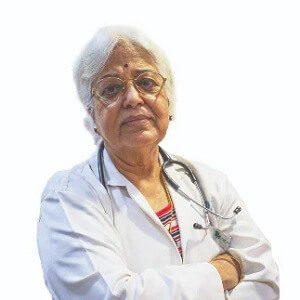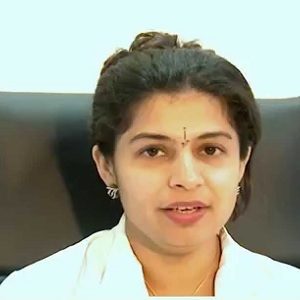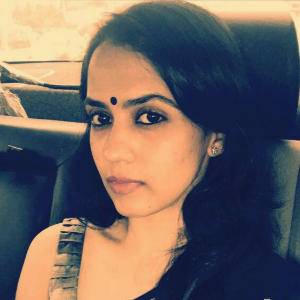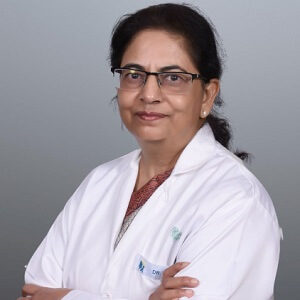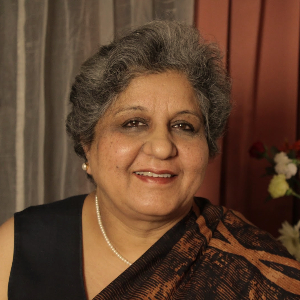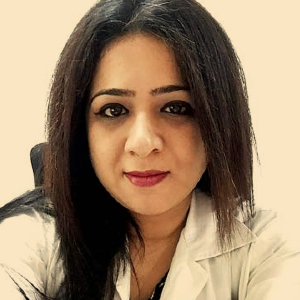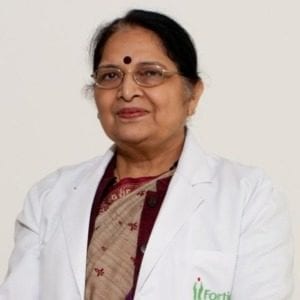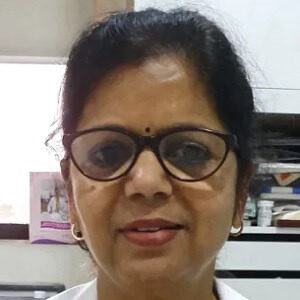Best Doctors in India for Pap Smear Test
- Obstetrician & Gynaecologist, New Delhi, India
- Over 55 years’ experience
Profile Highlights:
- Dr. Shakti Bhan Khanna is a well-known obstetrician and gynecologist in New Delhi. She has over five decades of work expertise in academics and this arena.
- A specialized ‘Khanna’s Sling Operation’ technique for Vault Prolapse developed from her Obstetrics and Gynecology experience has received immense success.
- Dr. Khanna is working as a senior consultant at Indraprastha Apollo Hospital and Apollo Cradle & Children’s Hospital since December 1995.
- Dr. Khanna specializes in complex reproductive treatments, gynecological laparoscopy, gyne-endocrinological treatment, infertility and high-risk pregnancies, and pelvic reconstructive surgery.
- Dr. Khanna has delivered many orations and received various felicitations.
- Gynecologist, Gynae-Oncologist, Gurugram, India
- Over 20 years’ experience
Profile Highlights:
- Dr. Shradha Chaudhari is an eminent name in the Department of Gynaecology and Gynae Oncology.
- She has made an enormous contribution to the upliftment and improvement of the treatment quality of gynecological patients suffering from oncological conditions. She has done multiple certificate degrees pertaining to her specialization, which adds to her expertise.
- Obstetrician & Gynaecologist, Gurugram, India
- Over 20 years’ experience
Profile Highlights:
- Dr. Smita Vats is a dedicated gynecologist & obstetrician in Delhi/ NCR. She received extensive training in advanced gynecological endoscopy, laparoscopy, and hysteroscopy from renowned surgeons in India and abroad.
- Dr.Smita Vats is especially interested in infertility treatments, gynecologic endoscopic surgeries, high-risk pregnancy management, and adolescent and menopausal issues.
- IVF Specialist & Gynaecologist, Mumbai, India
- Over 17 years’ experience
Profile Highlights:
- Dr. Sneha Sathe is a consultant gynecologist and infertility specialist in Mumbai and associated with Nova IVI Fertility.
- She has close to a decade of experience in the field of ART and Reproductive medicine and has achieved several successful pregnancies through IVF, IUI, ICSI, and other techniques of assisted reproduction.
- Dr. Sneha Sathe finds special interest in mild IVF and is also experienced in other aspects of gynecology such as management of PCOS, recurrent implantation failure, endometriosis, and failed IVF cycles.
- Obstetrician & Gynaecologist, New Delhi, India
- Over 22 years’ experience
Profile Highlights:
- Dr. Sohani Verma is a well-known Gynecologist and Obstetrician in India, with approximately 22 years of experience in numerous treatments in these disciplines. Dr. Verma serves as a senior consultant at Indraprastha Apollo Hospitals.
- She specializes in infertility and IVF treatments, and she also founded a sperm bank in the hospital in 2002. She has 22 years of IVF and infertility experience in the UK and India.
- Dr. Sohani Verma worked as the Academic Coordinator for the Department of Obstetrics and Gynaecology at Indraprastha Apollo Hospitals in New Delhi.
- IVF Specialist & Gynaecologist, New Delhi, India
- Over 30 years’ experience
Profile Highlights:
- Dr. Sonia Malik is a renowned gynecologist and obstetrician in India specializing in IVF and ART.
- Dr. Sonia Malik founded the Southend Fertility and IVF Center with the motive of helping infertile couples have a family, and the clinic is considered one of the best in India.
- She holds an extensive experience of 30+ years in Gynecology, Obstetrics, and Infertility and specializes in various types of ARTs including IVF, ICSI, and IMSI. Dr. Malik has performed over 8000 fertility procedures with around 25 IVF cycles and 20 IUI cycles every month.
- IVF Specialist & Gynaecologist, Mumbai, India
- Over 24 years’ experience
Profile Highlights:
- Dr. Sulbha Arora is a well-known Gynecologist and Obstetrician and an Infertility Specialist in Mumbai currently working with Nova IVI Fertility.
- She has 24+ years of experience in IVF and Assisted Reproductive Techniques (ART) and has helped a large number of women enjoy the happiness of motherhood.
- Her primary area of focus includes fertility medicine, fertility preservation, third-party reproduction, and ultrasound.
- Obstetrician & Gynaecologist, Gurugram, India
- Over 42 years’ experience
Profile Highlights:
- Dr. Suneeta Mittal is a renowned name in the field of obstetrics & gynecology who has done national as well as international research in women’s health leading to the introduction of emergency contraception & Medical abortion in India.
- Previously, Dr. Suneeta Mittal has served as a professor as well as head of the department of obstetrics & gynecology at All India Institute of Medical Science, New Delhi.
- She has multiple areas of expertise, such as infertility, adolescent reproductive health, endocrinological disorders, laparoscopic and hysteroscopy surgeries, as well as high-risk pregnancies.
- IVF Specialist & Gynaecologist, New Delhi, India
- Over 22 years’ experience
Profile Highlights:
- Dr. Sunita Arora is a leading infertility specialist in New Delhi who specializes in IUI, IVF, laparoscopies, hysteroscopies, and repeated IVF failure cases
- After completing her education, she joined the Department of Obstetrics and Gynecology, at Govt Medical College as a consultant. Later she moved to Mount Sinai Hospital, New York, from where she received her training in IVF and Reproductive Medicine.
- Obstetrician & Gynaecologist, New Delhi, India
- Over 35 years’ experience
Profile Highlights:
- Dr. Sushma Prasad Sinha is one of the top Gynaecologists and Obstetricians in India, having over 35 years of experience. She is primarily a well-known name in infertility & IVF with an unrivalled success rate.
- Dr. Sinha specialises in the ovarian cyst, fibroid, endometriosis, and ablation laparoscopic procedures; hysteroscopic surgeries, vaginal surgeries, tubal reconstruction, Colposcopy, loop cone cervical biopsies, and fertility preservation surgeries.
- She works in Indraprastha Apollo Hospital as an obstetrician and gynaecologist.
- Dr. Sushma Prasad Sinha has also written articles for many medical publications and a book chapter titled “Effective Approach to Basic Evaluation of Subfertile Couples.”
Best Hospitals in India for Pap Smear Test
Pap Smear
Pap smear also termed as Pap test, is a procedure for testing cervical cancer in women. It involves collecting cells from the cervix, which is the lower narrow end of the uterus, which lies at the top of the vagina.
Detecting the cancer early on, with a Pap smear, gives one a greater chance of curing it. This procedure can also detect changes in your cervical cells that may suggest cancer developing in the near future. A Pap smear can easily help you detect any abnormal cells, which is your first step in stopping the possible development of cervical cancer.
Purpose
The purpose of Pap smear is to screen for cervical cancer.
Regular Pap smears are recommended for women every three years from the age of 21. For women who are HIV-positive or those having a weakened immune system from chemotherapy or organ transplant, it is needed more frequently.
This procedure is usually done in conjunction with a pelvic exam. For women who are older than the age of 30, the Pap test can be combined with a test for human Papillomavirus (HPV) – a common sexually transmitted infection that can lead to cause cervical cancer. The HPV test may be done instead of a Pap smear in a few cases.
Women who are aged 30 and older may consider Pap testing every five years if the procedure is combined with HPV testing. Or they can also consider HPV testing instead of the Pap test.
Your doctor may recommend more frequent Pap smears, regardless of your age, if you have certain risk factors such as:
- A Pap smear that showed precancerous cells or a diagnosis of cervical cancer
- HIV infection
- Exposure to diethylstilbestrol (DES) before birth
- A history of smoking
- Weakened immune system due to chemotherapy, organ transplant or chronic corticosteroid use
You should discuss the benefits and risks of Pap smears with your doctor and decide what’s best for you based on your risk factors.
There are certain situations in which a woman and her doctor can end Pap testing such as:
After a total hysterectomy: After a total hysterectomy, surgical removal of the uterus including the cervix, you can ask your doctor if undergoing Pap smears is still required.
You will likely be able to discontinue Pap smears, if your hysterectomy was performed for a noncancerous condition, such as uterine fibroids.
However, if your hysterectomy was for a precancerous or cancerous condition of the cervix, it is likely that your doctor will recommend continuing routine Pap testing.
Older age: It is generally agreed by doctors that women can choose to consider stopping routine Pap testing at the age of 65 if their previous tests for cervical cancer have been negative.
You can discuss your options with your doctor and together you will be able to decide what’s best for you based on your risk factors. Your doctor might recommend you to continue with the tests if you are sexually active.
Preparation
You should follow these tips prior to your test for ensuring that your Pap smear is most effective:
- Avoid intercourse, douching as well as any vaginal medicines or spermicidal foams, creams or jellies for a minimum of two days before the Pap smear, as these may cause abnormal cells to be obscured or washed away.
- It is better if you don’t schedule your Pap smear during your menstrual period.
During the Procedure
A Pap smear can be performed in a doctor’s office and it takes just a few minutes. You might be asked to fully undress or only from the waist down. You will need to lie down on your back on an exam table with your knees bent.
First, your doctor will be gently inserting an instrument called a speculum into the vagina. This holds the walls of your vagina apart so that your doctor is easily able to see your cervix. You might experience a sensation of pressure in the pelvic area while the speculum is being inserted.
Then your doctor will need to take samples of your cervical cells with the use of a soft brush and a flat scraping device which is called a spatula. This usually does not hurt.
After the Procedure
After the procedure is complete, you can resume your normal activities without any restrictions.
Depending on the type of procedure you’re undergoing, your doctor will transfer the cell sample collected from your cervix into a container that holds a special liquid to preserve the sample. He/she might also use a glass slide.
Then the samples are transferred to a laboratory where they are examined under a microscope in order to look for characteristics in the cells which can indicate cancer or a precancerous condition.
After this, the samples are transferred to a laboratory. Here they are examined under a microscope to look for characteristics in the cell that can indicate cancer or a precancerous condition.
You can ask your doctor regarding how long you will need to wait before the results of your test are out.
Results
The results of your Pap smear can either be normal or abnormal.
Normal Pap smear- If the results are normal, this means that there were no abnormal cells identified. The normal result is also termed as negative. If your result is normal, you won’t be needing this test again for at least three years again.
Abnormal Pap smear- However, if the test results are abnormal, you need not worry, as this doesn’t necessarily mean that you have cancer. It just means that there are cells in your cervix which are abnormal and some of them may be precancerous.
Abnormal cells are of several levels:
- atypia
- mild
- moderate
- severe dysplasia
- carcinoma in situ
Milder abnormal cells are generally more common as compared to severe abnormalities.
Depending on your results, your doctor might recommend:
- increasing the frequency of your Pap smears
- getting a closer look at your cervical tissue using a procedure termed as Colposcopy
During a colposcopy exam, your doctor will take the help of light and use magnification to see the vaginal and cervical tissues more clearly. In some cases, they can also take a sample of your cervical tissue in a procedure termed as a biopsy.

